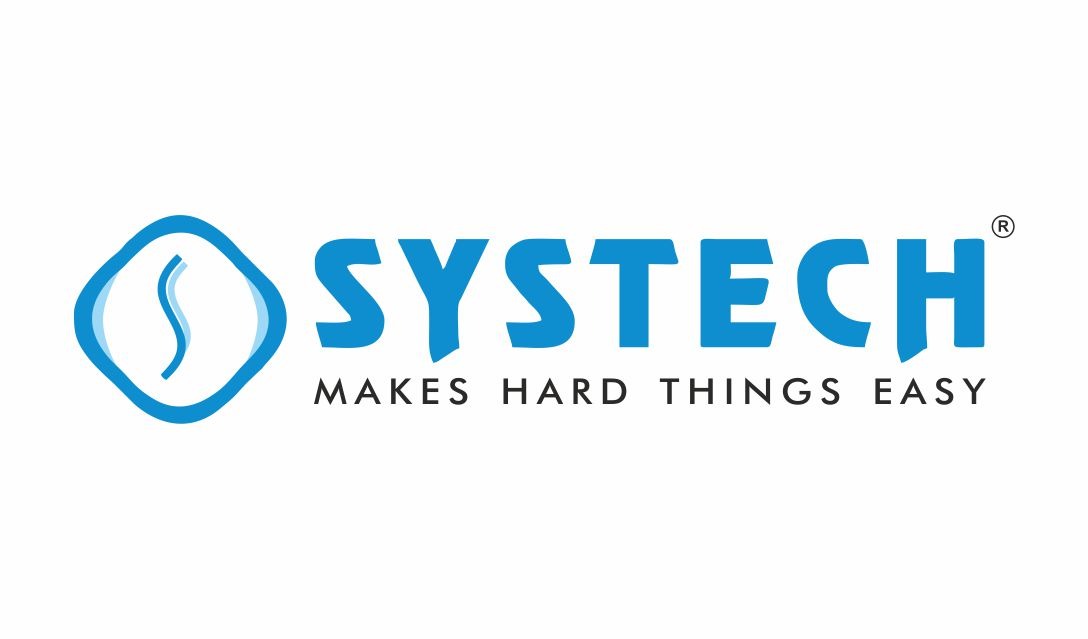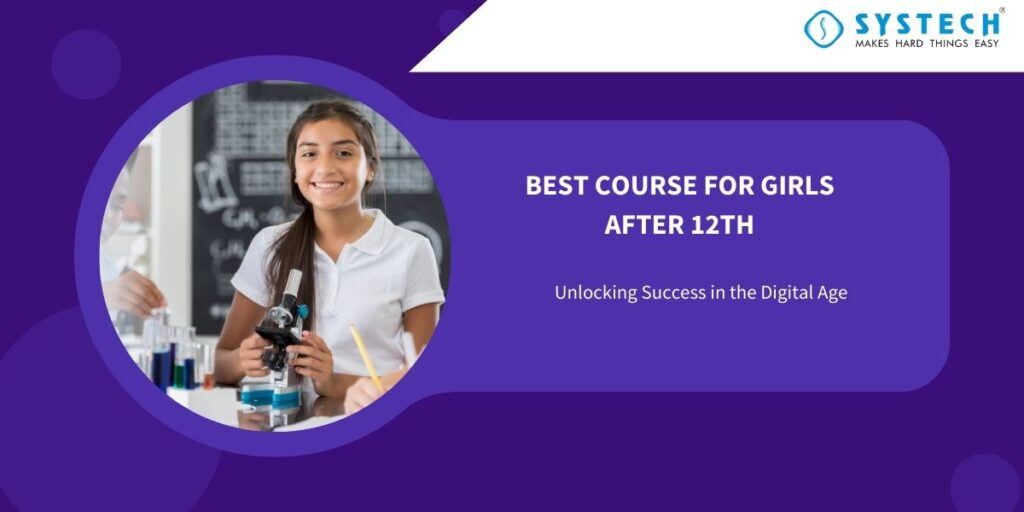Table of Contents
Best Course for Girls After 12th: A Guide to Thriving Careers
Introduction
Selecting the best course after the 12th is one of the most important decisions for any girl aspiring to build a rewarding career. With the rise of the digital age, fields like digital marketing, cybersecurity, networking, data science, and software development have emerged as promising options.
In this blog, we’ll answer pressing questions like, “Which course is best for a girl?” or “What are some easy courses after 12th?” We will also highlight how these fields empower women with skills to thrive in the job market.
Why Tech and Digital Courses Are the Best Choice for Girls?
The world is moving towards technology and digital innovation, offering immense career opportunities for women. These industries are flexible, lucrative, and full of growth potential, making them a good choice for ladies seeking independence and financial stability.
Here are the top reasons why girls should opt for tech and digital fields:
- High Demand: Industries are actively hiring skilled professionals in these areas.
- Global Opportunities: The skills you gain can open doors worldwide.
- Flexibility: Many roles offer remote working options and flexible hours.
- Empowerment: Break stereotypes and join a thriving industry that values talent.
Top Courses for Girls After 12th
Let’s analyze the best and easy courses after 12th that cater to various skillsets and interests:
Digital Marketing - Build Brands Online
The Gateway to Creativity and Strategy
Digital marketing is a good course for women who love creativity and innovation. With companies worldwide focusing on online presence, digital marketers are in high demand. You’ll learn skills like social media marketing, SEO, content creation, and analytics.
Why Choose Digital Marketing?
- Quick to learn and easy to start after 12th.
- High-paying jobs with growth opportunities.
- Freelance or work-from-home options.
Key Highlights:
- Duration: 3–6 months (certifications) or 1 year (advanced courses).
- Career Opportunities: Social Media Manager, SEO Analyst, Content Marketer, etc.
Networking: The Backbone of IT
Networking is about creating and maintaining communication systems. For girls interested in the inner workings of IT systems, this course is a perfect choice. It focuses on configuring networks, managing servers, and troubleshooting IT issues.
Benefits of Networking Courses
- Excellent growth opportunities.
- Strong demand in industries like IT, telecom, and government sectors.
- A technical but manageable learning curve.
Key Highlights:
- Duration: 6 months to 1 year.
- Career Opportunities: Network Administrator, IT Support Specialist, Cloud Engineer.
Cybersecurity: Protecting the Digital World
Cybersecurity is a great option for girls who want a challenging and rewarding career. This course involves protecting data and systems from cyber threats and is one of the most sought-after professions today.
Why Cybersecurity is Popular?
- Growing demand due to increasing cybercrime.
- High-paying roles with prestigious companies.
- Exciting and impactful work.
Key Highlights
- Duration: 6 months to 2 years (depending on the certification/degree).
- Career Opportunities: Ethical Hacker, Security Analyst, Incident Responder, etc.
Data Science: Making Sense of Big Data
Data science is ideal for girls who enjoy working with numbers, analysis, and problem-solving. This course covers data analysis, machine learning, and predictive modeling to solve real-world problems.
Advantages of Data Science Courses
- High demand in industries like finance, healthcare, and e-commerce.
- Opportunity to work with cutting-edge technologies.
- Lucrative and impactful career path.
Key Highlights:
- Duration: 1–2 years.
- Career Opportunities: Data Analyst, Business Analyst, Machine Learning Engineer.
Software Development: Create the Future of Technology
Software development is an excellent choice for girls interested in coding and app development. You’ll learn programming languages, software design, and development practices to create applications.
Why Software Development is a Good Option?
- Opportunities to innovate and create.
- Wide range of specializations (web, mobile, AI, etc.).
- High global demand with remote job options.
Key Highlights
- Duration: 1–3 years (depending on the course/degree).
- Career Opportunities: Software Developer, Web Developer, Mobile App Developer.
How to Choose the Right Course for You?
Ask yourself the following:
- What are your interests? (Creativity, analysis, problem-solving, etc.)
- What is your preferred work environment? (Remote, flexible, office-based?)
- How much time can you invest in learning?
Inspiring Women in Tech
Many Indian women have made remarkable strides in technology, entrepreneurship, and innovation. Their journeys are a source of inspiration for girls who aspire to build careers in tech. Here are five women who have excelled in their careers after pursuing tech-related fields:
Arfa Kareem Randhawa – A Visionary in the Tech World
Arfa Kareem from Pakistan became the youngest Microsoft Certified Professional at just 9 years old. Her early start in technology continues to inspire young girls around the world to pursue careers in computer science and technology.
Richa Kar – Revolutionizing E-Commerce
Founder of Zivame, Richa Kar transformed the way Indian women shop for undergarments. By leveraging digital marketing and e-commerce platforms, she created a successful online store that broke societal taboos and empowered women.
Aditi Avasthi – AI-Powered Education
Aditi Avasthi’s Embibe platform uses artificial intelligence to personalize educational experiences. Her work in AI has made a significant impact on India’s education system, helping students prepare more effectively for exams.
Neha Narkhede – Innovator in Data Engineering
Neha Narkhede, co-founder of Confluent, has revolutionized real-time data streaming. Her contributions to data engineering have empowered companies to process and analyze massive data in real-time, showcasing the immense potential of data science.
Debjani Ghosh – Leadership in the IT Industry
As the President of NASSCOM, Debjani Ghosh has played a key role in shaping India’s IT and business services industry. Her leadership exemplifies how women can rise to influential positions in global tech companies.
These inspiring women demonstrate how tech courses can lead to groundbreaking success and careers in diverse fields like e-commerce, AI, data science, and leadership roles. With the right skills, you too can achieve great things, just like these trailblazers.
Conclusion: Shape your Future with the Best Courses for Girls After 12th
The best course for girls after 12th depends on their interests, goals, and aspirations. Whether it’s digital marketing, networking, cybersecurity, data science, or software development, these fields promise financial independence, growth, and flexibility. Choose a course that aligns with your passion, and take the first step toward a thriving career!
Related Courses
FAQs
Which course is best for girls after 12th?
Digital marketing, cybersecurity, networking, data science, and software development are the best courses for girls after 12th due to their growth potential and flexibility.
What is a good course for ladies to start a career?
A good course for ladies is digital marketing, as it is quick to learn, flexible, and has a high demand for professionals in almost every industry.
Are there any easy courses after 12th for girls?
Yes, digital marketing and basic networking courses are relatively easy to start for beginners and offer rewarding career opportunities.
Which course has the highest salary for girls?
Data science, software development, and cybersecurity offer some of the highest salaries for professionals in these fields.
How long do these courses take to complete?
Course durations vary, from 3–6 months for certifications to 1–3 years for advanced degrees.
Can I take these courses online?
Yes, many institutions and platforms offer online certifications and degrees for these courses.
Do I need a science background to enroll in tech courses?
Not necessarily. Courses like digital marketing and basic IT networking can be pursued without a science background.
Is digital marketing a good career for girls?
Absolutely! It is creative, flexible, and offers high earning potential with remote work options.
Are tech jobs suitable for girls?
Yes, the tech industry is inclusive and provides equal opportunities for women to thrive.
Can I switch fields later in my career?
Yes, many skills in tech and digital fields are transferable, making career switches easier.
Which tech course is beginner-friendly?
Digital marketing is the most beginner-friendly course.
Is there a scope for girls in cybersecurity?
Yes, cybersecurity is a growing field with immense scope for women.
What are the job opportunities after data science?
Data analysts, business analysts, and machine learning engineers are popular job roles in data science.
Can I freelance after completing these courses?
Absolutely! Fields like digital marketing, software development, and data analysis offer excellent freelancing opportunities.

